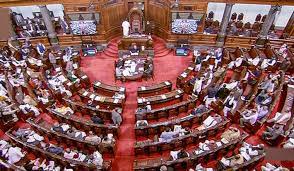How Do Numbers Add Up For The Government And Opposition In The Rajya Sabha? BRS Rajya Sabha MPs Issued Whip To Vote Against Delhi Services Bill
On Monday, the Bharat Rashtra Samithi (BRS) whipped its Rajya Sabha representatives to vote against the Delhi Services Bill.
The Delhi Services Bill has emerged as a key area of agreement for the INDIA alliance, therefore the news is encouraging for the opposition. Arvind Kejriwal, the chief minister of Delhi and the convener of the Aam Aadmi Party (AAP), had already traveled all across the nation to meet with opposition figures in an effort to forge a unified front against the law, which replaces an ordinance that was issued in May.
Both the Narendra Modi administration and the Opposition group INDIA lack a clear majority in the Rajya Sabha, which means that both blocs must rely on support from nonaligned parties.
According to PTI, BRS issued a statement asking all of its Rajya Sabha members to vote against any legislation that would replace the Delhi Services Ordinance.
The Delhi Services Bill is what?
Informally known as the Delhi services bill, the National Capital Territory of Delhi (Amendment) Bill, 2023 is a piece of legislation. The Narendra Modi administration’s ordinance from May has been replaced with this one.
The Modi government effectively overturned a Supreme Court ruling from earlier that month that gave control of Delhi’s bureaucracy to the elected government in all matters aside from policing, public order, and land when it promulgated an ordinance in May creating the National Capital Civil Service Authority (NCCSA) to handle transfers of and disciplinary actions against Group-A officers from the DANICS cadre.
The AAP rejected the ordinance because it has long called for more authority in Delhi’s special form of government and has often claimed that the Modi administration meddles in how the government operates via the Lieutenant Governor.
The Delhi Services Bill was opposed by INDIA, a coalition of 26 parties that includes AAP.
The ordinance has been contested by the AAP administration in the Supreme Court, and the case is now before a Constitution bench. However, the outcome of the present hearing is unrelated to whether the bill will be introduced in the parliament. Additionally, there are examples of the Executive overruling judicial decisions via the legislature dating back to the first PM Pandit Jawaharlal Nehru’s administration.
How are the numbers in Rajya Sabha added up?
The Bharatiya Janata Party (BJP) does not have a clear majority in the Lok Sabha, in contrast to the Lok Sabha.
According to the Rajya Sabha website, the BJP has 92 representatives in the 245-member body. There are 100 MPs in the larger National Democratic alliance (NDC) alliance, which is headed by the BJP.
As there are still some open seats, the majority threshold is 120. The majority-mark would have been 123 if every seat had been filled.
Both the Opposition INDIA alliance and the NDA, which no longer has a significant non-BJP member, lack a clear majority. India has 101 MPs, according to the PTI. As a result, both blocs must rely on non-aligned parties.
There are seven Bharat Rashtra Samithi (BRS) members of parliament. With the backing of these seven MPs, India would have 108 votes.
The following non-aligned parties have votes that might make the measure pass or fail:
BJD (Biju Janata Dal): 09
Party of YSR Congress: 09
01. Janata Dal-Secular
01. Bahujan Samaj Party
:01 Telugu Desam Party
Additionally, three Independents and five MPs have been nominated. The five non-aligned parties have a combined total of 21 votes, and when the nominated and Independent MPs are included, the number of non-aligned votes increases to 29.
These 29 non-aligned votes in the Rajya Sabha will determine whether or not any legislation, including the Delhi Services Bill, passes. Of these 29, the NDA needs 20, whereas INDIA currently need 12 of them.
What is anticipated of non-aligned parties’ votes?
In order to oppose the measure, the Bharat Rashtra Samithi (BRS) has already issued a whip, ending the uncertainty.
The other parties’ voting histories might be used to determine how they felt about the Delhi Services Bill.
The BJD (nine MPs) may support the Delhi Services Bill since it has historically voted in agreement with the Modi administration. According to PTI, the YSR Congress Party is also anticipated to back the Modi administration.
There are also indications of thawing relations between the BJP and the Janata Dal-Secular (JD-S). The JD (S) has said it would work with the BJP in Karnataka, where both parties are in the opposition. This could result in support in the Rajya Sabha, although no news has yet been received.
These regional parties have rescued the Modi administration on the majority of times, according to an article in The Deccan Herald. The Nationalist Congress Party (NCP) and Shiv Sena are two parties that have divided into two sections, which complicates the electoral scenario.
The Delhi Services Bill has been amended by the government: report
According to a study, the Delhi Services Bill differs significantly from the earlier-promulgated ordinance in three key ways.
According to the report, the law has removed the problematic clause that was reportedly intended to reverse the effects of a Supreme Court judgment issued on May 11th, according to Hindustan Times.
According to the HT article, “It also wants to amend how tribunal heads are to be chosen in the national capital, now giving certain prerogatives to the lieutenant governor instead of the Ordinance’s method of having the President of India be the ultimate signature.







